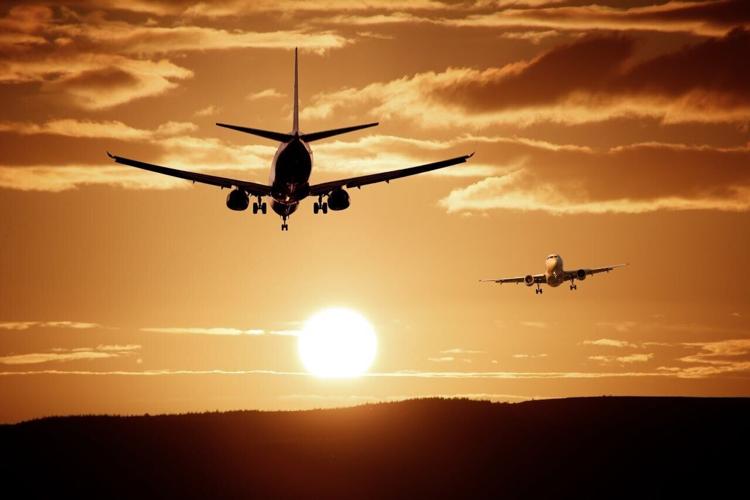
Photo by Pixabay via Pexels
A new study has found a majority of Americans feel “plagued” by nerves and anxiety by the mere thought of international travel.
In the past year, the poll of 2,000 U.S. travelers, conducted by Talker Research, found 94% have traveled domestically, and 28% have traveled internationally.
Fears of traveling abroad have increased for both groups — 30% of domestic travelers feel nervous about international travel, while 20% of travelers with international experience also feel nervous about doing it again.
And while 88% said they already have plans to travel in the next 12 months, four in 10 are starting to get cold feet over their next vacation due to how "unsafe" they think traveling will be.
Travel-related anxieties stemmed from potential travel delays and cancellations (42%), means of travel (40%), current government policies (40%) and current perceptions about American tourists (39%).
Others cited fears over the possibility of getting hurt while traveling (31%), not knowing much about their destination (27%), having traveled to unsafe locations in the past (16%) and having bad past travel experiences (15%).
A secondary study of 1,500 U.S. travelers conducted by AXA Assistance revealed people mostly travel to visit family (34%), go on summer vacations (34%) or escape for weekend getaways (32%).

Photo by Connor Danylenko via Pexels
Nearly all (95%) said safety was undoubtedly important to them. Some shared the more specific reasons safety is front of mind for them while abroad.
"A lot of the time I travel alone, so I like to be prepared and also know my options in case something happens," said one respondent.
According to another: "I am going to another location, where I don't have my usual sources, so I have to trust that I will be safe. Also, I am going on vacation to relax and have a good time, not to worry about safety."
"Traveling should be something people can really enjoy and be able to relax. But for many, that's not always the case," said Stephen Samataro, chief revenue officer at AXA Assistance. "The anxieties people feel are justified and reasonable. That's why safety is so critical for people — people want the reassurance that they can worry less when they're on vacation and focus more on their adventures."
The study run by AXA Assistance found only 10% bought travel insurance ahead of their last trip, with many believing it's either unnecessary (49%), expensive (40%) or that their trip is too short (28%).
But 65% are now considering the purchase before their next trip. Travelers are mainly motivated by having peace of mind (70%), having international travel plans (55%) and wanting to prevent unexpected costs (51%).
A third (32%) even consider travel insurance their go-to travel hack, and is even more popular amongst international travelers specifically (45%).
When looking at travel insurance, many said it's "absolutely crucial" that they seek out a trustworthy company (50%), have benefits that meet their needs (45%) and have clear terms and conditions of coverage (44%).
"Travel insurance is a straightforward method of reassurance," continued Stephen. "The anxiety and nervousness of travel can melt away once you know you have that protection abroad."

Anete LÅ«siÅa
Survey methodology:
Talker Research surveyed 2,000 Americans who have traveled domestically or internationally within the past 12 months; the survey was commissioned by AXA Assistance and administered and conducted online by Talker Research between May 20 to May 27, 2025.
We are sourcing from a non-probability frame and the two main sources we use are:
- Traditional online access panels — where respondents opt-in to take part in online market research for an incentive
- Programmatic — where respondents are online and are given the option to take part in a survey to receive a virtual incentive usually related to the online activity they are engaging in
Those who did not fit the specified sample were terminated from the survey. As the survey is fielded, dynamic online sampling is used, adjusting targeting to achieve the quotas specified as part of the sampling plan.
Regardless of which sources a respondent came from, they were directed to an Online Survey, where the survey was conducted in English; a link to the questionnaire can be shared upon request. Respondents were awarded points for completing the survey. These points have a small cash-equivalent monetary value.
Cells are only reported on for analysis if they have a minimum of 80 respondents, and statistical significance is calculated at the 95% level. Data is not weighted, but quotas and other parameters are put in place to reach the desired sample.
Interviews are excluded from the final analysis if they failed quality-checking measures. This includes:
- Speeders: Respondents who complete the survey in a time that is quicker than one-third of the median length of interview are disqualified as speeders
- Open ends: All verbatim responses (full open-ended questions as well as other please specify options) are checked for inappropriate or irrelevant text
- Bots: Captcha is enabled on surveys, which allows the research team to identify and disqualify bots
- Duplicates: Survey software has “deduping” based on digital fingerprinting, which ensures nobody is allowed to take the survey more than once
It is worth noting that this survey was only available to individuals with internet access, and the results may not be generalizable to those without internet access.






